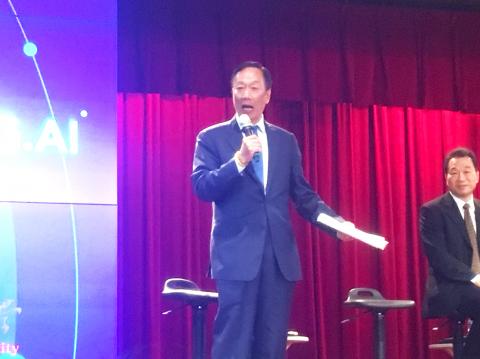Hon Hai Precision Industry Co (鴻海精密) yesterday announced that it might spend NT$10 billion (US$342 million) over the next five years on artificial intelligence (AI) talent cultivation and technology development in Taiwan, in a bid to localize the development of AI applications in its industrial Internet-focused operations.
“[NT]$10 billion is the minimum investment in Taiwan. I am willing to spend US$10 billion here if it is what it takes to grow more AI applications in ‘smart’ manufacturing locally,” company chairman Terry Gou (郭台銘) told a news conference at the company’s headquarters in New Taipei City’s Tucheng District (土城).
Hundreds of the company’s employees also attended the announcement.

Photo: Chen Jou-chen, Taipei Times
Gou said Hon Hai would financially support its employees to go abroad and pursue advanced studies in the field of AI.
“Take your family to MIT [the Massachusetts Institute of Technology] or the University of Tokyo. We will fully support your expenses,” he said.
Hon Hai is to open its manufacturing bases around the world to Taiwanese academics, start-ups and individuals to experiment with their AI applications and jointly explore the possibility of AI uses in the industrial Internet era, Gou said.
“I am calling on talent in Taiwan: Hon Hai can be a place where you can develop AI technologies,” Gou said.
Company executive vice president Lu Fang-ming (呂芳銘) said Hon Hai has been collecting a wide range of data from its manufacturing bases around the world for more than five years, which includes data on product design, supply chains, production and logistics.
The company has used the critical data and cloud-computing infrastructure, as well as developed AI solutions, to increase its production efficiency, with five plants that run around the clock without lights launched in China last year, Lu said.
Hon Hai plans to recruit at least 100 AI talents in Taiwan in the first phase of its project to push efforts in industrial Internet-driven technologies, Lu said.
The company is to set up industrial Internet-focused AI labs in Taipei and Kaohsiung, and then expand to Shenzhen, Shanghai, Nanjing and Beijing in China, he said.
The company also plans to establish AI labs in Japan and the US, he added.
The company has more than 10 high-performance computing (HPC) facilities in several cities worldwide, including Kaohsiung, Tokyo, Osaka, Japan, and Prague, as well as Wisconsin and San Diego in the US, Gou said.
The firm’s global HPC network is to be a key platform to connect and share industrial data and AI solutions, which the company would open to small and medium-sized enterprises, Gou said.

NATIONAL SECURITY THREAT: An official said that Guan Guan’s comments had gone beyond the threshold of free speech, as she advocated for the destruction of the ROC China-born media influencer Guan Guan’s (關關) residency permit has been revoked for repeatedly posting pro-China content that threatens national security, the National Immigration Agency said yesterday. Guan Guan has said many controversial things in her videos posted to Douyin (抖音), including “the red flag will soon be painted all over Taiwan” and “Taiwan is an inseparable part of China,” while expressing hope for expedited “reunification.” The agency received multiple reports alleging that Guan Guan had advocated for armed reunification last year. After investigating, the agency last month issued a notice requiring her to appear and account for her actions. Guan Guan appeared as required,

A strong cold air mass is expected to arrive tonight, bringing a change in weather and a drop in temperature, the Central Weather Administration (CWA) said. The coldest time would be early on Thursday morning, with temperatures in some areas dipping as low as 8°C, it said. Daytime highs yesterday were 22°C to 24°C in northern and eastern Taiwan, and about 25°C to 28°C in the central and southern regions, it said. However, nighttime lows would dip to about 15°C to 16°C in central and northern Taiwan as well as the northeast, and 17°C to 19°C elsewhere, it said. Tropical Storm Nokaen, currently

PAPERS, PLEASE: The gang exploited the high value of the passports, selling them at inflated prices to Chinese buyers, who would treat them as ‘invisibility cloaks’ The Yilan District Court has handed four members of a syndicate prison terms ranging from one year and two months to two years and two months for their involvement in a scheme to purchase Taiwanese passports and resell them abroad at a massive markup. A Chinese human smuggling syndicate purchased Taiwanese passports through local criminal networks, exploiting the passports’ visa-free travel privileges to turn a profit of more than 20 times the original price, the court said. Such criminal organizations enable people to impersonate Taiwanese when entering and exiting Taiwan and other countries, undermining social order and the credibility of the nation’s

‘NATO-PLUS’: ‘Our strategic partners in the Indo-Pacific are facing increasing aggression by the Chinese Communist Party,’ US Representative Rob Wittman said The US House of Representatives on Monday released its version of the Consolidated Appropriations Act, which includes US$1.15 billion to support security cooperation with Taiwan. The omnibus act, covering US$1.2 trillion of spending, allocates US$1 billion for the Taiwan Security Cooperation Initiative, as well as US$150 million for the replacement of defense articles and reimbursement of defense services provided to Taiwan. The fund allocations were based on the US National Defense Authorization Act for fiscal 2026 that was passed by the US Congress last month and authorized up to US$1 billion to the US Defense Security Cooperation Agency in support of the